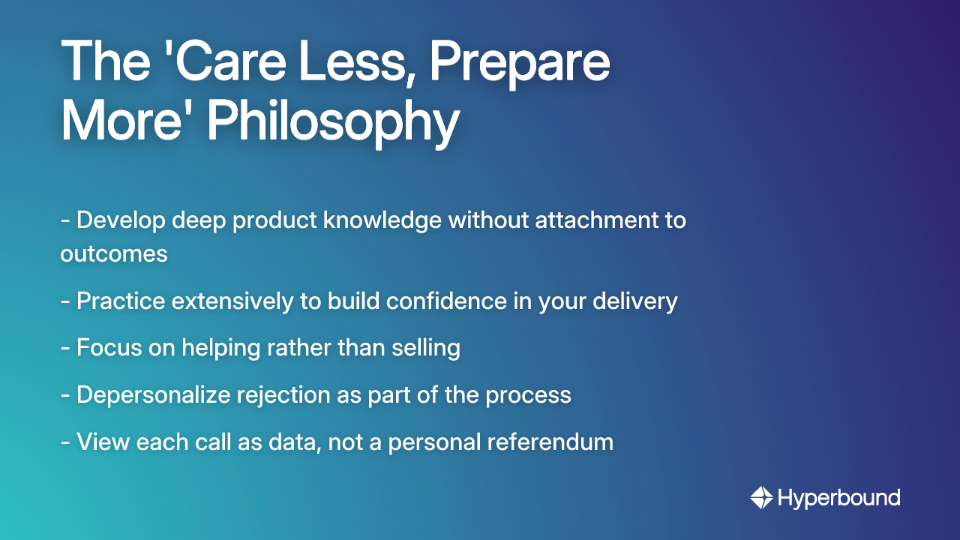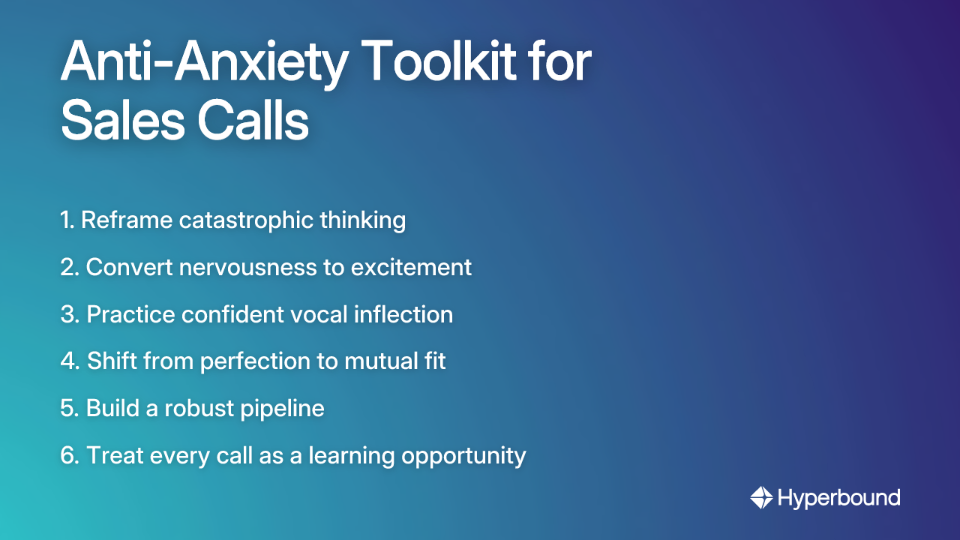
You've set up the call. Your notes are ready. You've researched the prospect extensively and rehearsed your SaaS pitch until you could deliver it in your sleep. But as you dial, your heart races, your mouth dries up, and that familiar knot of anxiety tightens in your stomach.
Then something strange happens: the prospect reschedules. And when you finally connect a week later—unprepared and distracted by three other emergencies—you somehow deliver your most authentic, engaging call in weeks.
Sound familiar?
"I've noticed that the calls that I 'care' the least about end up being the best," confessed one sales rep on Reddit. This counterintuitive reality isn't just anecdotal—it's a psychological phenomenon that could transform your entire approach to sales.
The irony stings: the more desperately you try to craft the perfect call, the more artificial and "salespersony" you sound. The pressure to hit your sales goals creates the very anxiety that sabotages your performance.
But what if there's a better way? What if the secret to closing more deals isn't caring more, but caring less—at least about the outcome of any single conversation?
The Counterintuitive Psychology of Low-Pressure Selling
Let's talk about call reluctance—that knot in your stomach before dialing. It's not just you being "soft." It's a legitimate psychological condition that affects a staggering 40% of all salespeople at some point in their careers, regardless of experience level. In fact, 48% of B2B salespeople actively dislike and find stress in cold calling.
Why do high-pressure tactics fail so consistently? Because the moment your prospect feels your "commission breath"—that desperate need to close—they instinctively enter a zone of resistance. Your anxiety becomes their anxiety. Your neediness triggers their defenses.
In contrast, low-pressure selling creates space for authentic connection. As Edward C. Bursk wrote for Harvard Business Review, effective selling is about "not driving the prospect into a buying decision, but letting them reach the decision themselves." This approach positions you as a consultant rather than a predator.
Sales expert Bob Burg reinforces this: "a low-pressure—even no-pressure—sales approach will ultimately result in far more sales." When you remove the pressure, you create the psychological safety needed for your prospect to genuinely consider your offer.
The solution isn't to care less about your customer—it's to care less about forcing a specific outcome from each engagement. This is the "Care Less, Prepare More" mindset that transforms anxious reps into confident closers.
The 'Care Less, Prepare More' Mindset Shift
This mindset isn't permission to be lazy—quite the opposite. The "care less" philosophy is only effective when paired with diligent preparation. Let's break this down:

Prepare More: The Foundation of Confidence
Confidence isn't conjured from thin air—it's built through competence. Companies that invest in proper sales training see 57% more sales effectiveness for a reason. Here's what preparation looks like in practice:
- Act as a Consultant, Not a Salesperson: Shift your goal from "selling" to "helping." When you genuinely understand your prospect's pain points, your pitch transforms from a boilerplate monologue into a collaborative solution-building exercise.
- Practice Until It Hurts: Record your mock calls and review them critically. As one sales rep admitted, "Most painful thing, but damn if it doesn't get you to improve." This feedback loop is crucial for identifying filler words, awkward pauses, and areas where your voice modulation needs work. Using a platform like Hyperbound's AI Sales Roleplays provides a safe, repeatable environment to practice critical conversations and receive instant, objective feedback without risking live deals.
- Become a Product Expert: If you're genuinely excited about what you're selling, that confidence will naturally enhance your tone and posture. Customers can sense when you believe in your solution versus when you're just going through the motions.
Care Less: The Art of Detachment
Now for the counterintuitive part—emotional detachment from outcomes:
- Adopt the "I Don't Need This Business" Mindset: This isn't arrogance; it's a powerful psychological stance that eliminates neediness from your voice. When you don't need the sale, you can ask better qualifying questions and walk away if there's no fit—a confidence that prospects find magnetic.
- Embrace "SW³N": Some Will, Some Won't, So What? Next. This mantra from Sales Insights Lab reframes sales as a numbers game, depersonalizing rejection. When one prospect says no, you simply move to the next, without the emotional baggage.
- Focus on Process, Not Prize: Remember, "You don't get paid for the outcome of one pitch. You get paid for the total outcome of all your pitches." Your job is to execute your process perfectly across all your dials and touches, not to force a commitment from any single prospect.
This balance—meticulous preparation with serene detachment—creates the optimal psychological state for sales success. You're prepared enough to handle any question confidently, yet detached enough that no single call determines your self-worth.
Practical Techniques for Taming Call Anxiety and Perfectionism
Sales perfectionism is a double-edged sword. While attention to detail matters, perfectionism can paralyze. According to research, 34% of all salespeople identify as perfectionists, often struggling with:
- High self-criticism: Mentally replaying and criticizing every word after a call
- Personalizing rejection: Viewing each "no" as a personal failure
- Slow work pace: Getting bogged down in details instead of maintaining call volume
Here's your anti-anxiety toolkit for overcoming these perfectionist tendencies:

1. Reframe Your Thoughts Before Each Call
Practice cognitive restructuring by asking: "What's the absolute worst that could happen?" The prospect says no. They hang up. They get irritated. None of these outcomes are fatal to your career or life. This perspective immediately reduces the perceived stakes.
2. Transform Anxiety into Excitement
Physically smile before you dial. This simple act changes your brain chemistry and improves your voice tone. As one customer care rep discovered, visualizing a successful, relaxed conversation can transform nervousness into excitement.
3. Use Downward Inflection
Ending sentences with a downward inflection projects confidence, while upward inflections sound uncertain or questioning. Practice this technique during mock calls until it becomes natural.
4. Shift Your Goal
As one sales rep shared, the key is to "switch my mindset from 'be perfect' to 'it doesn't matter if this meeting goes well'." Your goal isn't perfection; it's determining if there's a mutual fit.
5. Build a Healthy Pipeline
The best antidote to call anxiety is a robust pipeline. When you have many opportunities, the pressure on any single call decreases dramatically. As one experienced rep put it, "Keeping filling the hopper" is the most effective way to detach from outcomes.
6. Treat Each Call as a Learning Opportunity
Even "failed" calls provide valuable data. What qualifiers worked? Where did the conversation stall? How did your tone affect the prospect's responses? With Hyperbound's AI Real Call Scoring, you can get objective, data-driven feedback on your actual customer conversations. This growth mindset transforms every rejection into a stepping stone toward improvement.

From Anxious Rep to Confident Closer
True sales mastery lies in the delicate balance between rigorous preparation and serene detachment. You must know your material cold, understand your prospect's needs deeply, and then paradoxically—let go of the outcome.
The immense pressure you feel on a sales call isn't coming from the prospect; it's coming from within. As one rep wisely suggested, "Treat the person like you would treat a friend. You wouldn't be anxious, you wouldn't put the pressure on." This doesn't mean abandoning your professional goals—it means approaching the conversation with the relaxed tonality and genuine curiosity of a friendly chat.
By caring less about the result of any single conversation, you give yourself the freedom to be more present, more authentic, and ironically, far more effective. Your reps will increase, your anxiety will decrease, and your confidence will naturally grow.
Remember: Some will buy. Some won't. So what? Next call.
That's where your power lies—not in the outcome of any single call, but in your commitment to the process, your confidence in your preparation, and your willingness to let go of what you cannot control.
Now pick up the phone. Your best call is waiting to happen—precisely because you care less about making it perfect.
Frequently Asked Questions
What is the 'Care Less, Prepare More' sales mindset?
The 'Care Less, Prepare More' mindset is a sales philosophy that combines deep preparation with emotional detachment from the outcome of any single call. It means you invest heavily in understanding your product, your prospect's needs, and practicing your delivery. This builds true competence. The "care less" part involves letting go of the desperate need to close each deal, which reduces anxiety, eliminates "commission breath," and allows you to have more authentic, consultative conversations.
Why do high-pressure sales tactics often fail?
High-pressure sales tactics often fail because they trigger a prospect's resistance and anxiety. When a prospect senses your desperation to make a sale (often called "commission breath"), their natural defense mechanisms kick in. This creates an adversarial dynamic instead of a collaborative one. Low-pressure selling, in contrast, creates the psychological safety for a prospect to genuinely evaluate your offer and reach a buying decision on their own terms.
How can I overcome sales call anxiety?
You can overcome sales call anxiety by focusing on preparation, reframing your mindset, and detaching from the outcome. First, build confidence through competence by mastering your product knowledge and practicing your pitch. Second, use techniques like cognitive restructuring ("What's the worst that can happen?") to reduce the perceived stakes. Finally, adopt a "Some Will, Some Won't, So What? Next" mentality to depersonalize rejection and focus on the process, not the result of a single call.
What are the best ways to build sales confidence?
The best ways to build sales confidence are through diligent practice, shifting your goal from selling to helping, and building a robust pipeline. Confidence is a byproduct of competence. Practice your calls—ideally using AI role-playing tools for safe, objective feedback—until your delivery is smooth. When you focus on genuinely helping a prospect solve a problem, you position yourself as a consultant, which feels more natural. Lastly, having a full pipeline reduces the pressure on any individual deal, making it easier to stay relaxed.
How do I stop personalizing rejection in sales?
To stop personalizing rejection, reframe sales as a numbers game and focus on the process, not the individual outcome. Adopting a mantra like "Some Will, Some Won't, So What? Next" (SW³N) is a powerful tool. It reminds you that not every prospect is a good fit, and a "no" is not a reflection of your worth. Concentrate on executing your sales process perfectly across all your calls. Your success is measured by the total outcome of all your efforts, not the result of one conversation.
What is the difference between low-pressure selling and not caring about the customer?
Low-pressure selling means caring less about forcing a sale, not caring less about the customer. In fact, this approach allows you to care more about the customer's actual needs. By removing the pressure to close, you can shift your focus to active listening, understanding their pain points, and collaboratively finding the best solution. It's about being a trusted consultant who helps them make the right decision, even if that decision is not to buy from you.

Book a demo with Hyperbound
.png)













